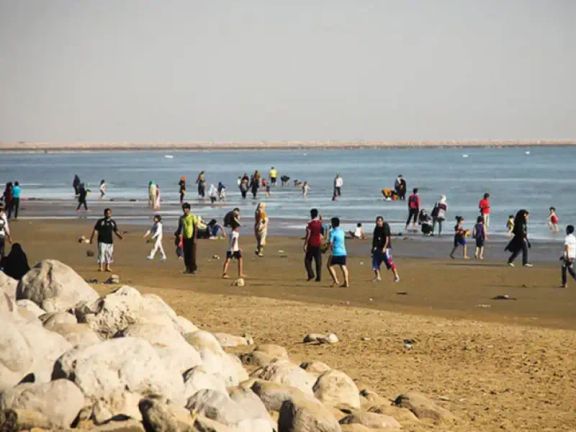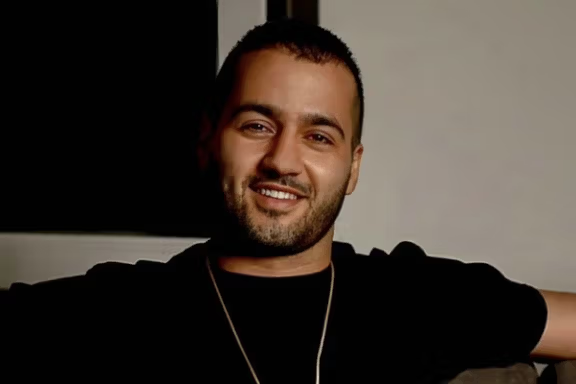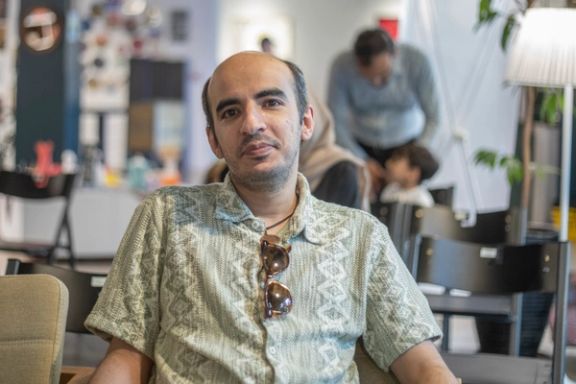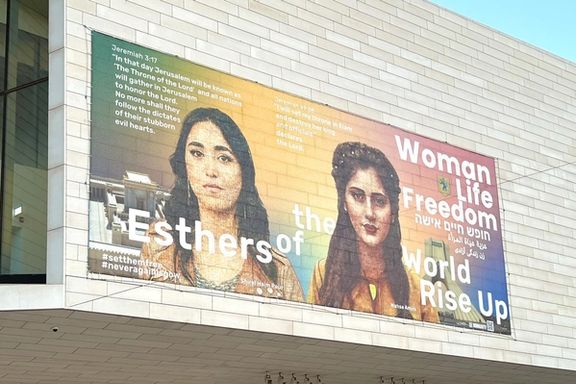Iran Escalates Beach Surveillance Deploying 7,000 Police to Enforce Hijab

Iran is ramping up its hijab enforcement as summer approaches with the deployment of 7,000 police officers to the country’s northern beaches.

Iran is ramping up its hijab enforcement as summer approaches with the deployment of 7,000 police officers to the country’s northern beaches.
Deputy commander of the police force, Ghasem Rezaei announced that the forces are tasked with "controlling the beaches and recreation areas and maintaining order," particularly focusing on ensuring compliance with the nation’s mandatory hijab.
The police operation will place officers directly along the northern coastlines, with Rezaei warning that any “deviation” from the government-imposed norms will be met with legal consequences.
Every year, with the arrival of summer and the rising temperatures in Iran, the enforcement of hijab by the police intensifies.
Despite the government's strict enforcement of mandatory hijab, a movement of civil disobedience persists. Swathes of women are increasingly visible in public areas without a hijab, actively protesting against the restrictive mandates.
The commander-in-chief of the police force, Ahmadreza Radan, previously announced an electronic surveillance initiative for the northern beaches, signaling a broader crackdown to monitor and control beachgoers.
The intensified enforcement follows widespread protests in 2022 triggered by the death of Mahsa Amini while in the custody of police for not wearing her hijab properly.

Twelve bipartisan members of Congress, led by Brad Sherman (D-CA), have written to US President Joe Biden urging him to "swiftly apply all available sanctions" to those involved in the death sentence of dissident Iranian rapper Toomaj Salehi.
The legislators asked Mohammad Reza Tavakoli and Morteza Barati, the judges in charge of both courts against Salehi, to be sanctioned in the US, noting that the UK and Canada had already sanctioned Barati.
“Toomaj Salehi's death sentence is the Islamic Republic's latest act of repression towards the Iranian people and cannot go unanswered,” the letter read.
Salehi was arrested for his support of the protests that erupted across Iran after 22-year-old Mahsa Amini died in the custody of the morality police in 2022. A UN Fact-Finding Mission has since said that the Iranian state is responsible for the physical violence that led to Amini’s death. The Islamic Republic killed over 500 protesters and arrested thousands during the demonstrations, dubbed as Woman, Life, Freedom.
The singer was sentenced to over six years in prison in July 2023 but was released on a technicality last November. He was quickly rearrested and given a death sentence by a revolutionary court in Isfahan, which sparked a global outcry and demonstrations in Europe and North America amid continued outrage over the use of capital punishment by the Iranian government in political cases.
“The Ayatollah's regime has a decades-long record of torturing and murdering Iranian dissidents, from a series of mass torture and executions of up to 30,000 Iranian political prisoners in 19883 to the murder of about 1,500 in the 2019 'Bloody November' crackdown to the murders of potentially thousands of protesters since September 2022,” the US lawmakers said in their letter.
Last week, a bipartisan group of US lawmakers introduced TOOMAJ Act. The bill aims to impose targeted sanctions on Iranian officials and judges who arrest, jail, and impose death sentences on dissidents.
Targeting Oppressive Officers to Mitigate Abuse in the Judiciary Act would impose sanctions “on the judges, prosecutors and investigators of the Islamic Republic’s Islamic Revolutionary Courts, which are involved in sham trials, torture, and inhumane treatment and sentencing of Iranian protesters and political dissidents.”
“Toomaj Salehi has used his platform to give a voice to the voiceless and bravely speak out against the Iran regime’s torture, abuse, and crackdown against the free will of the Iranian people," Rep. Young Kim (R-CA), one of the bill's lead sponsors, said in a statement to The Associated Press. “Unfortunately, he is just the latest victim of the regime’s cruelty.”
US lawmakers have introduced various bills since the beginning of the Woman Life Freedom in Iran. In April, the US Congress passed the MAHSA Act, which addressed human rights abuses in Iran. Under the Mahsa Amini Human Rights and Security Accountability Act sanctions will be imposed on Iran's supreme leader's office, its appointees, and anyone associated with it. To what extent, however, the Biden administration plans to implement the bill is unclear.

IRGC-linked media in Iran said on Wednesday that arrested blogger Hossein Shanbehzadeh is a "fugitive Mossad agent" with a history of insulting religious figures and connections to Israeli intelligence.
Iran's Judiciary reported the arrest of a "fugitive Mossad agent" in the city of Ardabil, northwestern Iran. The IRGC-affiliated Tasnim News says the detained individual is Shanbehzadeh, the popular social media activist and proofreader arrested on Tuesday.
Shanbehzadeh was arrested in Ardabil on Tuesday. The Ardabil prosecutor's office claimed the individual "had a history of insulting Shia imams and was in contact with high-ranking Mossad officers."
Refuting the accusations as "unjustifiable," his family stated that he has always used his real identity on social media, and that the charges have been levelled against him 24 hours after his arrest, without him having access to a lawyer.
Shanbehzadeh, who posted a dot in response to Supreme Leader Ali Khamenei's tweet last month, employing a sarcastic editorial tone, saw his comment receive considerably more likes than Khamenei's original tweet.
In response to his arrest, numerous users voiced their outrage, linking it to a comment he made under an official post by Ali Khamenei last month, which gained significant traction.
Chess grandmaster and Putin critic Garry Kasparov responded to news of Hossein Shanbehzadeh's arrest with a single dot on his X account.
A hashtag with his name in Persian has been tweeted over 57,000 times on X in the past few days.
One user wrote, "What information did Hossein have access to that he could spy on? Did he have missile or nuclear information? Why are you weaving nonsense..."
Human rights activist and former political prisoner Arash Sadeghi defined the crime of "espionage" under Islamic Republic law on X, writing: "The definition of the crime of espionage is that if a person provides classified information to people who are not authorized to access it, the act is espionage." He continued, "How can you accuse an editor, writer, and satirist whose only platform was his Twitter page of espionage?"
Conversely, some cited Shanbehzadeh's criticisms, including an exposé on Evin Prison's harsh practices, suggesting his arrest stems from governmental ire towards his outspokenness.
Shanbehzadeh was previously imprisoned in connection with the 2019 protests, facing charges of "insulting the sanctities and the leader of the Islamic Republic."
His arrest raises concerns about Iran's history of using espionage charges against critics, including the case of Maziar Ebrahimi, a businessman falsely accused of spying for Israel who was later exonerated.
Ebrahimi was tortured to 'confess' that he had been spying for Israel and was involved in the assassination of Iranian nuclear scientists in 2012. After releasing and allowing him to leave the country, Iran's government said that he was innocent.

The Iranian government has announced a new directive mandating Islamic dress codes for hospital patients and medical workers.
Majid Mohammadian, the head of the Hijab and Chastity Secretariat at the Ministry of Health, unveiled the directive on Thursday, requiring it be implemented in both public and private health institutions nationwide.
According to Mohammadian, "several new standard models of clothing have been designed, produced, including surgical gowns, underwear, trousers for colonoscopy, transvaginal ultrasound, breast ultrasound, mammography, special breastfeeding dresses, veils, and other garments."
He said that the new rules are intended to ensure patients' attire is in compliance with Islamic principles during medical procedures and diagnostic examinations.
The announcement comes amid escalating enforcement of hijab regulations under Project Nour, the clerical ruler's campaign to ensure adherence to hijab laws, which has led to increased physical confrontations and crackdowns on Iranian women.
The government's persistent push to enforce the mandatory hijab has reignited widespread condemnation both within Iran and internationally. Human rights organizations, student groups, and activists have vehemently opposed the measures, arguing that they represent infringements on basic freedoms and human rights.
As Iran waits for the official approval of the controversial hijab bill, titled "Protection of Family Through Promotion of Hijab and Chastity Culture", the government has already begun to enforce the new regime. The new regulations threaten women with arrest and impose harsh punishments such as travel bans for non-compliance with hijab mandates.

Canada has named Iran as one of the top four countries which gathers information to "harm and threaten Canadian citizens" and to "interfere with political systems and critical infrastructure."
As per the official statement released on Monday, three Canadian ministers identified Iran as one of four countries - China, Russia, Iran, and North Korea - engaged in extensive campaigns to compromise government and private sector computer systems.
"Foreign interference, enabled by sophisticated cyber tools, poses one of the most serious threats to Canada’s national security, economic prosperity and sovereignty, as well as our way of life," the statement read.
In its annual report released in May, the Canadian Security Intelligence Service (CSIS) highlighted the cyber attacks by the Islamic Republic that target Canada.
“Iran combines offensive cyber operations with cyber-enabled influence operations to assist in the pursuit of its geopolitical goals,” stated the CSIS report. “Canada remains a target for opportunistic credential harvesting, phishing attacks, and exploitation of digital infrastructure to facilitate future targeting opportunities against individuals of interest.”
Microsoft's Threat Analysis Center (MTAC) noted that Iran, Russia, and China will likely attempt to influence elections in the US and other countries in 2024.
In February, Iranian-Canadian MP Ali Ehsassi called for an investigation into Tehran's possible interference in the election.
“Given the catalog of malign and illegal activities committed by the Islamic Republic of Iran on Canadian soil, it would be naïve to believe that the Iranian regime has any compunction to shape public opinion in Canada,” he wrote to the Foreign Interference Commission, requesting testimony and relevant documents from Iranian-Canadians and others with substantial interests in the case.

Israel's latest strategy to take on its regional rival Iran is not with a weapon, but a new tool in its soft power arsenal which aims to bridge relations between the two nations locked in escalating tensions.
It may be surprising, but the Israeli Defense Forces (IDF) has rolled out a Persian-language channel on various social media apps, highlighting the significance it sees on the relationship between social media and diplomacy.
Using the channel, the IDF speaks directly to the people of Iran and circumvents the censorship of the Iranian regime, gaining access to millions of Iranians through their social media page ‘IDF Farsi,’ which appears on Twitter, Instagram and Telegram.
“We wanted to build a bridge to the Iranian people,” said Beni Sabti, the mastermind behind IDF Farsi.
Sabti, an Israeli of Iranian origin, used to serve as a Persian spokesperson for the Israeli government on Iranian issues. He is also with the Iran program at the Tel Aviv-based Institute for National Security Studies (INSS) think-tank.
He said it may seem strange to think the Israeli army is providing the outreach, but it’s a system he believes will lead to greater understanding, more dialogue and less wars.
“We only wanted to talk to them [Iranians], and they only wanted to talk to us [Israelis]. Because we knew that these small steps will bring the big step to prevent war….it’s with a lot of emotion and from the heart,” said Sabti.
The social media account also communicates in Persian proverbs and poetic terms by making reference to great Persian poets like Hafez and Saadi.
The messaging is one of unity and kinship between Israelis and Iranians, recognizing a distinction between the people and Iran’s authoritarian government, which has repeatedly called for the destruction of Israel since the 1979 Islamic Revolution overthrew the monarchy and ushered in a clerical regime. Iran is the only country in the world where its government officially denies the Holocaust.
On the platform X, IDF Farsi recently shared a video clip with Iranian-American artist Hooman Khalili who came to Israel to paint a series of murals, celebrating the historic ties between Iran and the Jewish peoples, and raise awareness on the oppression of women and men inside the Islamic Republic.
Khalili, along with an Israeli-Iranian solider from IDF Farsi, unveiled in a video posted to social media, a mural in Israel dedicated to Iranian dissident rapper Toomaj, who has been sentenced to death for his lyrics critical of the regime. IDF Farsi soldiers are often seen in video clips with Iranian dissidents from around the world on their page.
In September 2023, IDF Farsi posted a powerful video honoring Mahsa Jina Amini - marking the one year anniversary of her death. Amini died while under the custody of the so-called morality police for allegedly wearing the hijab improperly, showing too much hair. Her death sparked massive demonstrations in Iran and around the world and was the catalyst for the Women, Life, Freedom movement.
The video uses a montage of anti-government protest videos and photos, asking “what is the price of freedom?"
Communicating information about the Iranian regime’s financing of its proxy terror groups is another message IDF Farsi conveys.
“We show them how, for example, how the regime wastes their money for Hezbollah, or for budgeting Hamas,” said Sabti.
Sabti was born in Tehran seven years before the Islamic Revolution of 1979. He was 15 years old when he and his family escaped persecution in Iran, fleeing on foot and eventually seeking refuge in Israel in 1987.
He served in the IDF’s Intelligence Corps, and as a researcher, mostly in projects related to Iranian culture, influence and media. Sabti is also with the Iran program at the Institute for National Security Studies (INSS) think-tank.
"We talk to them [Iranians] directly, above the head of the regime,” said Sabti.
Sabti told Iran International in an interview in Tel Aviv that the message is also clear to the authoritarian powers in Iran.
"We see you. We know a lot about you. We know how you act, your methods,” said Sabti.
“From time to time, Israel reveals some information that no one knows about. Suddenly we discover that there are some regime terrorists here and there, and they want to harm the Jews,” said Sabti
Iranian public opinion matters to Israel
With tens of thousands of followers, and engagement on both sides, it appears IDF Farsi has had impact and influence.
Israel, "cares about Iranian public opinion,” said Iran analyst, journalist and author Arash Azizi.
"Israel has tried to, probably with some degree of success. Actually, it has tried to influence public opinion in Iran,” said Azizi.
“Iran and Israel are in an indirect war. And the reason that a lot of countries do focus on Iran is that…the average Iranian, does not like the government and does not think like their government. So that's why they try to sort of, target them,” added Azizi.
The Netherlands-based Gamaan institute conducted an opinion survey in 2023 finding that more than 80 percent of 158,000 respondents in Iran reject the Islamic Republic and prefer a democratic government.
Azizi said the Persian language page of the US State department, for example, is failing at outreach.
“The State Department of the United States is not doing so well. You know, if I'll start with something just very basic, the very [Persian] script that they use, it's so outdated,” he said.
The European Union has an Arabic spokesperson but nothing in Persian.
“It’s a lot of resource…it's like a few hundred thousand dollars a year. So not every country will want to spend…But I think countries increasingly realize that they need to do it,” said Azizi.
While he applauds IDF Farsi’s creativity and outreach, he said how much weight the Israeli’s government's message carries to the Iranian public, is a separate issue.
“I think just purely looking at it from as an analyst. Basically they've [Israel] been able to, reach an audience in Iran. They seem to be pretty creative. They try to celebrate Iranians, you know, for example, they do videos for Nowruz and Yalda” said Azizi.
The question is, according to Azizi, is how effective would IDF Farsi’s messaging be if a full out war did take place between the two nations?
“The messaging would be much more important, but also more limited. I mean, if you ran missiles in another country, you know, what kind of messages you put on them would perhaps be of less importance in some ways. Right? So I think it's a tricky, it's a tricky situation,” said Azizi.
Social media to foster conversation despite state control
Social media expert and founder of mediatedreality.com Jesse Miller said the idea of message sharing between so-called adversarial states is not new, it’s just taken on a new form with the online world.
“If we go back in time and we think about the segregation of Germany with the Berlin Wall in Eastern versus West Germany. What we did see was messaging and news of the day being shared across the wall. So we would hear these stories of individuals on the West side, you know, taking a newspaper and cutting it so the article could be then affixed to a brick or a rock and thrown over, the wall in the middle of the night,” said Miller.
Miller pointed to a more recent example in North Korea where he said the WeChat app is increasingly being used to contact China and South Korea, to avoid surveillance from North Korean authorities.
The intent of the platform is what counts, said Miller.
“Sometimes the intent is very benign. It's just information that exists on the internet. Other times it's targeted for the purpose of making people more aware,” said Miller.
Miller said IDF Farsi “is just very targeted with specific language and from a state where potentially, you know, the sworn enemy piece turns into maybe we can just learn more about each other by using a platform where you're not necessarily having to navigate whether state can control or not.”
When it comes to opening up conversations to directly communicate to Iranians in their own language, IDF Farsi is using a platform like Twitter in a healthy way, according to Miller.
“To see Israel use a platform like Twitter to not only directly communicate to individuals who are speaking Farsi, but also communicate in a very healthy way. Some of the content that kind of bridges the gap there is positive when it comes to what we want to see for addressing issues when it comes to conflict,” said Miller.